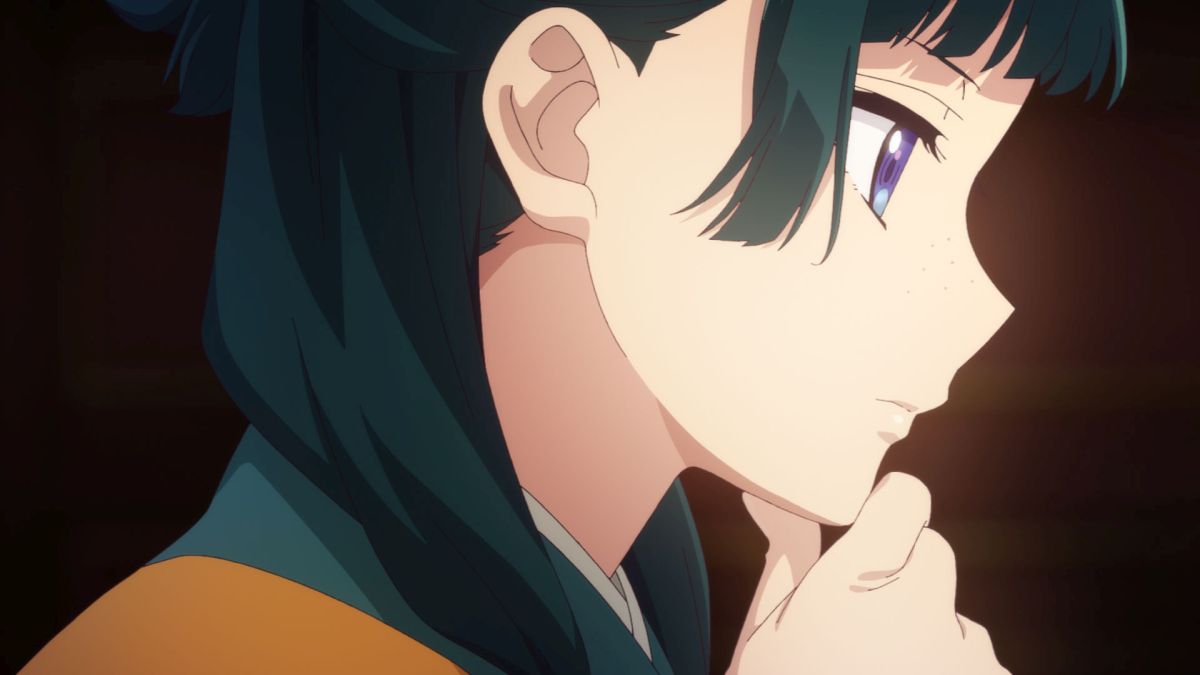Life is not easy for Maomao, the central character of The Apothecary Diaries. The young apothecary lives a quiet life servicing the red-light district, until she’s one day kidnapped into servitude at the royal palace.
Here, she could have simply worked away the days until she made enough wages for freedom. But an illness falls over two of the emperor’s favorite concubines and their children, drawing Maomao’s curiosity. And from there, events spiral out to bring Maomao further into the viper’s nest of rear palace politics.
The Apothecary Diaries is certainly an interesting premise for an anime. If you’re newer to these stories, you might think of battle arcs and isekai series with bizarrely long names, with a few surprises and lowlights. This year has surprised me with its vibes few times over, though; first with Frieren, a brilliantly melancholic series, and now again with the pseudo-historical light novel adaptation The Apothecary Diaries.
I say pseudo-historical because, while The Apothecary Diaries series has yet to define its world in any concrete terms, its fictional world certainly draws obvious parallels to ancient China. Its status as period piece alone, especially without any fantasy or unrealistic twist (yet), would already set it apart. But the court drama aspect adds an extra twist, making it much more interesting for anyone looking for something a little different.
Trapped in the palace
Maomao finds herself trapped in the rear palace, an area inhabited by those from three distinct walks of life: the emperor’s concubines, their all-female servants, and the eunuchs who assist them. Aside from a few other appearances, these three classes—each with their own shifting hierarchies—are the structure the show is built on.

Take the example I laid out from the first episode: two concubines, Lady Lihua and Lady Gyokuyou, both have children who are falling ill. As Maomao takes an interest, she also starts to see the simmering tensions beneath the health crisis; each lady has their own standing to maintain within this system, drawing one to even suspect another of foul play.
The Apothecary Diaries reiterates this as Maomao, after the gorgeous eunuch Jinshi notices her talent for medicinal remedies and antidotes, becomes part of the court intrigue itself. As a food taster, she’s directly presented with the danger that someone may try to poison her lady’s food. But in other cases, Maomao uses her abilities to affect leniency on a misunderstanding, nurse the sick back to health, or in a particularly moving episode, allow love to flourish unabated.

What makes The Apothecary Diaries really click though is that, amidst all the court drama and intrigue, the human conflicts and emotional core stays centered. When one lady falls ill for mysterious circumstances, Maomao’s approach dissects not just the symptoms, but the core cause, often revealing a truth at the center.
Grounding it up
So yes, this is ultimately a mystery show too, with a “case of the week” vibe that fans of House would probably really dig. Still, it’s about an apothecary too, and that aspect is a draw all its own.
I wouldn’t say the medicinal solutions in The Apothecary Diaries come as close in elaborate, gratuitous exposition as something like Food Wars, but there’s a “this could happen” realism to each issue that keeps the mysteries compelling.
It would have been an otherwise easy thing, to have Maomao have some sort of special power or otherwise unrealistic solution-creating ability. Instead, she’s simply keen and knowledgeable. Empathy and observation, with a bit of a mind for Sherlock Holmesian logic, are the tools for Maomao’s diagnoses.

One of my favorite character traits that Toho Animation Studio and OLM draw attention to well is Maomao’s arm. Her arm is frequently bandaged and covered up, which leads some servant girls to think she was formerly abused; but in reality, Maomao tests various concoctions and remedies on herself, on this arm. (In one particularly funny flashback, we see Maomao actually letting a snake bit her arm, eager to diagnose the venom.)
Aoi Yuuki’s performance as Maomao also drives her character home extremely well. She is frequently cool and calculating, but breaks the façade for moments of joy, excitement, and sometimes embarrassment. A particularly powerful moment in episode four sees her reprimand another girl for a misstep in treatment, and it’s a highlight of the series thus far.
Drama through the ages
Add in some excellent animation work—plus knowing just when to let big, gorgeous stills linger for a moment or have a sad, knowing gaze sit on screen—and The Apothecary Diaries has been a refreshing series to keep up with each week.

While it does still have some room to pick things up—it’s taking a while for Jinshi’s quest to be berated to grow on me—The Apothecary Diaries has added some welcome variety to my lineup each week. As I said before, it’s been a good season for this. Frieren and TAD both offer those quiet, emotional beats.
But where The Apothecary Diaries sets itself apart is in its curious, yet effective blend of period-piece drama and episodic case-solving. If you’ve wanted a show where the detective played doctor using natural and herbal remedies, while also revealing some emotional and sometimes harsh truths lying just beneath the surface, this one’s for you.
Four episodes are out, as of this writing, and you can find them on Crunchyroll here.








